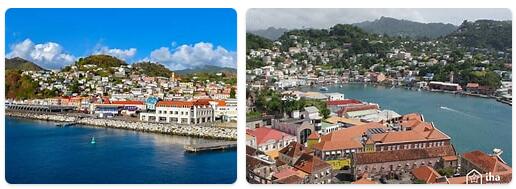
Grenada’s population in 2015 was estimated to be around 110,000, making it the smallest country in the Caribbean region. The majority of Grenadian citizens identify as Roman Catholic, with a sizeable minority of Protestants also present. The Grenadian economy is heavily reliant on tourism and agriculture, with these two industries accounting for nearly one-fifth of the country’s GDP. Other exports include spices and seafood. Grenada has strong trade ties with its Caribbean neighbours, particularly Trinidad and Tobago, as well as other countries worldwide. In terms of politics, Grenada is a unitary parliamentary democracy with a multi-party system. In 2015 Keith Mitchell was the Prime Minister after winning reelection in 2013. In foreign relations, Grenada is a member of both the United Nations and Caribbean Community (CARICOM) and is actively involved in international affairs such as peacekeeping operations. Relations with its Caribbean neighbours have been mostly positive but tensions remain between Grenada and Venezuela over maritime border disputes. See ehealthfacts for Grenada in the year of 2005.
Yearbook 2015

Grenada. In May, five of the member states of the Organization of Eastern Caribbean States (OECS), including Grenada, announced that they had launched a joint project to reduce poverty in the OECS countries. According to COUNTRYAAH, Saint George’s is the capital of Grenada which is located in North America. The project is funded by Chile and is supported by the United Nations Development Program UNDP. The other four countries are Antigua and Barbuda, Dominica, Saint Lucia and Saint Vincent and the Grenadines. The latter three, together with Grenada, were also among the total seven countries which in May signed an agreement with the EU that allows their citizens to spend shorter periods of residence in the EU countries without a visa.
- Also see AbbreviationFinder.org for Grenada country abbreviations, including geography, history, economy and politics.
During a tour of the Caribbean, during which he also visited Grenada, British Prime Minister David Cameron announced that the UK will contribute £ 360 million over the next few years in bilateral assistance to countries in the Caribbean. Grenada is one of the countries that will receive development support to, among other things, expand infrastructure and health care.
The United States now held Grenada militarily occupied and British Governor Sir Paul Scoon took over the leadership of a provisional government tasked with conducting elections. On December 3, 1984, under the surveillance of the occupying forces, a new parliament was elected. Herbert Blaize of the island of Carriacou headed a coalition of parties – the New National Party (NNP) – and with the support of the United States, he now assumed the prime minister’s post.
The new government immediately entered into an agreement with the IMF, whose guidelines were the traditional ones: cuts in public budgets, reduction in the number of public servants, freezing of wages and stimulating private business.
In order to avoid a repeat of the 1979 coup, the United States created a regional Caribbean security system, which Grenada was also incorporated into. The security system allows the Prime Minister to summon foreign troops when the security policy situation is uncertain.
In addition, at the end of 1996, the lawsuits against the coup makers ended. Bernard Coard, his wife Phyllis and the Army’s former commander Hudson Austin, along with 11 soldiers, were sentenced to death, and 3 others were sentenced to 30-45 years in prison. First and foremost for the assassination of Maurice Bishop, whom the United States itself had tried several times in 1979-83 to kill.
During his first years in power, Blaize succeeded in securing significant economic growth of 5-6% annually, based primarily on tourism, which received significant saline injection when the predominantly Cuban-built international airport was completed. Despite growth, youth unemployment and crime and substance abuse that had been virtually non-existent during NJM’s 4 years in power increased dramatically.
